Waterstones’ slogans analysed
I spent my last post banging on about brackets and full stops, so it’s going to be hard to refer to the subject of this post by its chosen name. Waterstones outraged punctuationazis when it dropped its possessive apostrophe. But now it’s got bigger fish to fry.

Waterstones is caught in a digital pincer movement from Amazon and its Kindle. In May, it announced a deal with Amazon to sell the Kindle and offer ‘e-reading services’ in-store. The chain has tried to put a brave face on it, but it’s hard to see this as a move they would have chosen. (Some commentators see it as suicidal.)
Such is the context for Waterstones’ latest branding push. The firm has launched five slogans designed to remind book-lovers why a trip to a bookshop is better than buying Kindle editions for next to nothing, with a tap of a finger, without leaving the sofa. Which, of course, it is.
Enough with the rambling foreword. Let’s get our teeth into chapter one.
Books you can’t put down are much easier to find when you can actually pick them up.
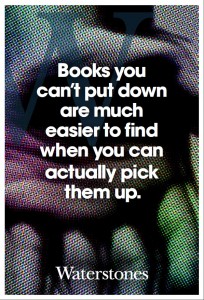
I really like the idea, but the execution does feel a bit clunky. Seventeen words is a lot, and it feels like they’re being asked to carry a fair amount of meaning.
I think the problem is ‘much easier to find’. It feels like a clause too far, and it’s a questionable claim too. Say what you like about Amazon, but you can’t really find a book more quickly than typing the title and pressing ‘return’. The line could be using ‘find’ in the sense of choice and identification rather than location, but I think that’s getting lost in translation.
I might have gone for a simpler line that promotes Waterstones itself more directly:
The place to pick up the unputdownable
Or maybe something a little more radical:
You can’t touch books you can touch
That one’s almost creative, isn’t it? Mother London, if we’re still cool after my Stella post, you can reach me on 01603 454111. Any time.
Even the most ardent reader will never reach the end of a good bookshop.
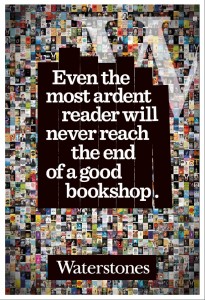
Looking at word choice first, the unusual ‘ardent’ sends an implicit message of intelligence and literariness to middle-class shoppers, arts graduates and other classic Waterstones demographics. It may also be a deliberate avoidance of the phrase ‘avid reader’, which has become a cliché.
‘Reaching the end’ is kind of moot. ‘Good bookshop’ is code for ‘proper bookshop like Waterstones’, but the point applies equally to Amazon or any old high-street remainder outlet – not to mention public libraries. Lots of places have lots of books.
I wonder if the real point here is eternal fascination or absorption, rather than sheer coverage and the impossibility of exhausting it. The experience of browsing the shelves, lost in thought, head tilted to one side, is one that never gets old. Personal yet communal, it’s a ritual all of its own – and it’s a world away from torpidly clicking around a website while slumped on the sofa.
Pursuing this slightly different strategy, I might have gone for something like:
Savour the choosing as much as the reading
I like the dactylic metre of that one. It reminds me of another catchy line I’ve always liked: ‘Shoes worth wearing deserve repairing’. Cheesy it may be, but if you want to be memorable, rhythm ’n’ rhyme hit the spot every time.
Words cannot do justice to the pleasures of a good bookshop. Ironically.
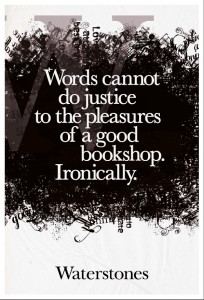
Ever since Alanis Morissette got it in the neck over ‘Ironic’ not being ironic (ironically), I’ve been paranoid about saying things are ironic when they’re not.
I think it probably is ironic that you can’t describe the pleasures of bookshops, which are full of words, using words – assuming that is indeed the thrust of this structurally unorthodox line.
However, what’s really ironic about this one is that it undermines its own raison d’être by conceding the impossibility of describing the experience it’s promoting. In other words, it’s an ad that deconstructs the very purpose of ads.
Also, since this will appear on an in-store poster, the audience might actually be experiencing the ‘pleasures’ when a poster butts in to say that it can’t describe them. Ironically.
I would take away the rhetorical ‘words cannot do justice’ and the ‘ironic’ punchline, because I think they’re abstract and distracting. That leaves us with ‘pleasures’, which could be our cue to talk about the sensual enjoyment of book-buying – looking at the spines, stroking the embossing, flicking through the pages and smelling the ink.
You could even make a playful link to another experience of sensual browsing and selection:
Choose me. Touch me. Take me home
Although that might be a bit off-message for a brand like Waterstones. Isn’t it ironic? (No, it’s not. Shut up.)
A good book will keep you fascinated for days. A good bookshop for your whole life.
This is my second favourite of the five. Thematically, it’s quite similar to ‘Even the most ardent reader’, but I think it makes the point more eloquently and elegantly.
It makes me think of this Brian Eno quote:
A forest seen from the air is complex and interesting. A single tree is equally complex. One leaf, even one molecule is endlessly fascinating. That’s how music should be.
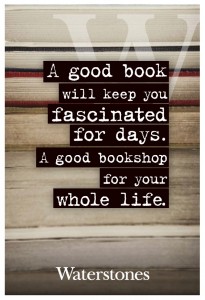
Staying with the cultural pretension, I’m also reminded of Jorge Luis Borges’ Library of Babel – a metaphysical library that comprises everything that could ever be written. The idea of a bookshop as a sort of fractal Castrovalva into which you could disappear for ever is beguiling – and it’s not really a sentiment you can imagine somebody having about a website. Shopping sites are means to an end; shops can be destinations in themselves.
Am I still going to moan about the execution then? Mm, yes, I think I am actually. Again, it just feels a bit too strung out. I’d tighten the whole thing up a bit:
A book will fascinate you for days. A bookshop, for a lifetime
Alternatively, what about going with a literary quote, like this from Christopher Marlowe?
Infinite riches in a little room
In fact, with enough time and effort, you could probably source (or crowdsource, God forbid) similar quotes for all the themes of this campaign. The implicit message would be that great writers endorse the bookshop concept, which wouldn’t do any harm and is bang on-message for the brand. However, Waterstones has used quotes quite a lot in its marketing previously.
A browser. Much better to be one than to use one.
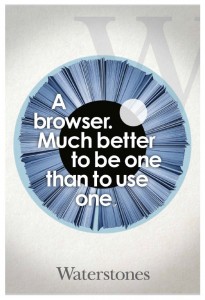
This is by far the hardest-hitting of the lines, sailing very close to ‘knocking copy’ by directly (if abstractly) comparing the online and high-street shopping experiences and coming out with an unequivocal value judgement in ‘much better’.
On a technical level, I like this one very much, for a number of reasons. It predicates itself nicely on the pun without overselling the gag. It gets across its message without using the word ‘bookshop’, leaving the audience to do some work for themselves and infer the context from the imagery and the Waterstones brand. And there’s absolutely no fat to be trimmed from the phrasing.
Visually, the eye formed from a circle of books is (I think) the most elegant and attractive of the five designs. It’s restful, too, which feels right for the subject matter – the first three layouts, for me, feel a bit hectic and claustrophobic.
The only possible weak point is the actual meaning of the line. Like the others, it presents itself as a motto or adage. However, with the phrase ‘much better’, the content writes a cheque that the reader’s moral compass might not cash.
The construction puts us in mind of proverbs like ‘better to have loved and lost than never to have loved at all’, or observations like John Stuart Mill’s ‘better to be a human being dissatisfied than a pig satisfied’. But in both those cases, it’s fairly clear why the first thing is regarded as better than the second. Why, exactly, is it better to be a browser than to use one?
The answer, I suppose, is that by ‘being’ rather than ‘using’, we are directly active in our own book-buying, rather than working via a digital proxy. The line draws a contrast between presence and absence – between an immediate, sensory and rewarding experience and a remote, insubstantial and frustrating one. That’s underlined by the ocular imagery, which invites us to think about physically viewing the actual books rather than gazing at a screen.
Will everyone get that from the line? I’m not sure – semi-consciously, perhaps. But even if they don’t make the right inference, they might still be hustled into agreement simply by the moral bullying of ‘much better’. Overall, the pros outweigh the cons and I think this is a winner.
High-street champion
Taking a step back to look at the campaign’s general positioning, I find it striking that the slogans refer to ‘bookshops’ in general rather than Waterstones in particular.
This is partly so that the lines can come across as timeless words of wisdom rather than self-interested sloganeering. Waterstones can thus position itself as the philanthropic champion of the high-street bookshop, while slyly burnishing its own brand in an indirect way. As marketing director Ros Hines puts it:
We have a powerful brand, and we should be using that to get over powerful messages that do more than simply promote individual books, but remind people just how good being in a bookshop is, and how important they are—and we are—to the British high street.
The danger is what I call ‘generic selling’ – making a case for your industry in general, rather than your product or service specifically. It’s a trap that many copywriters’ home pages (including, arguably, my own) fall into – telling someone who’s just Googled ‘copywriter’ why they really need a copywriter.
If you’re not careful, you could even help your competitor’s cause more than your own. The audience might agree that bookshops rock hard, but still prefer to go to WHSmith, so they can pick up this week’s Heat and a sodding great slab of Dairy Milk along with an insanely cheap copy of Fifty Shades of Grey. To forestall this, the right strategy would be to focus on Waterstones USPs like its wide range, pleasant atmosphere or helpful booksellers – emphasising the contrasts rather than eliding them.
In a way, the ‘bookshop’ positioning is inherently defensive. Although all the lines are positive in terms of message, the underlying theme is ‘online bad, high-street good’, with Number 5 coming closest to saying this straight out. E-innovation has rocked Waterstones’ marketing back on its heels, forcing it to devolve from differentiating against competitors to confronting the industry-wide threat of Amazindle. (You do wonder what Amazon, Waterstones’ new business partner after all, will make of this campaign.)
I feel good
I hope I’m not coming across as overly snarky. I think the basic strategy is perfectly sound – the only things I’d change are the emphasis (Waterstones specifically, not bookshops generally) and maybe some aspects of the execution. However, not everyone agrees. Marketing expert Damian Horner made this comment:
Waterstones is in a difficult position and I think the time to seduce people just with a feel-good message has gone… In this fragile economy, people will sacrifice atmosphere for price.
I think this is a bit harsh. As far as I can see, Waterstones is playing to its strengths. Despite running plenty of offers, it’s never been about price; if people want that, they’ll surely look elsewhere. And marketing on price would do real harm to the chain’s ‘powerful brand’.
So I think focusing on atmosphere and experience is absolutely the right way to go. It might not attract everyone, but it’ll appeal to the prospects who can most easily be converted. After all, in a ‘fragile economy’, what nicer treat could there be for the worried middle classes than going to buy a lovely new book?
Comments (20)
Comments are closed.
Those slogans are terrible. Absolutely horrendous. Vomit-inducing, even.
What on Earth is an “ardent reader” supposed to be? The word choice just makes me imagine some desperate housewife frotting herself daft with a copy of “50 Shades…”
They’ve really rubbed me up the wrong way. Excellent deconstruction, and some great alternatives there Tom.
Brilliant post Tom. I really enjoyed your alternative taglines – totally agree the lines could be far sharper and snappier. As a book lover I think using a few well-chosen literary quotes would have been far more effective. With this in mind, I’m reminded of a cracking quote from HG Wells that could have been applied by the copywriter:
“I write as straight as I can, just as I walk as straight as I can, because that is the best way to get there.”
– HG Wells
At the very least they could all be edited down to read much better. As you say at the outset, all a bit clunky.
Really good read, that, Tom…thanks!
All the original slogans, bar the last one, I had to read two or three times for them to actually go in. Your description of ‘clunky’ pretty much hits the spot!
Thanks for the comments so far. In view of their general tone, can I just reiterate that I do actually like some of these slogans, and the strategy that underlies all of them…
Great post. They are dire and I really don’t get the strategy, especially in the first one. I’m all for ‘real’ books and bookshops, but love the simplicity of online shopping and travelling light with my Kindle – like many, I dare say. Who wouldn’t?
Clutching at straws…
Maybe the copywriter was charging by the word 😉
@Michelle
Yes, I think that’s certainly possible. That’s why I have not named the agency: my comments are directed at the brand messages rather than those who’ve been involved (or not involved) in their creation. However, if they want to come on here and pick apart my versions, I will be happy to take it on the chin…
I don’t know. As a book lover myself – an ardent book lover, in fact – I should care about Waterstones’ predicament. But I don’t. It’s a high street shop with high street values that’s slowly realising the world is changing. I find it difficult to get sentimental about it – precisely because it’s just a shop. And not a particularly good one at that. I mean, the reason I started buying from Amazon wasn’t just about price – it was about choice, about getting stuff that was a bit off the beaten track. Waterstones have always gone for mass appeal, for playing it safe, for catering to the middlebrow. Which is fine. But it’s hardly Shakespeare & Co. And that’s the problem: I don’t go into Waterstones and feel as though I’m in the world of the arts, of literature, of imagination and beauty and freedom and possibility… I feel as though I’m in a high street shop. With crappy decor and a Costa Coffee upstairs.
Which is why those ads don’t work for me. Because they’re not true to Waterstones. They’re true to a good bookshop, maybe. But not to Waterstones.
This is how it’ll go: we’ll have Amazon and we’ll still have some genuinely good independent and niche bookshops (who know who their customers are). Waterstones will either disappear completely or scale itself right down. That’s fine with me.
I think these (see link below) Watersone’s ads are genius. No clunky slogans – just pictures. The words are in the image. Even the logo is integrated in the visual as opposed to being an afterthought.
http://www.thisisrealart.com/#/projects/view/81/waterstones
@Paul
I must admit, a lot of my warm feeling towards Waterstones is based on how it was a long time ago. Not when it was where Jamie’s Italian is now, but when it was where Gap is now. In those days, you had to be a graduate to work there (I think), and it did feel a bit more like the world of imagination and beauty. Or maybe I was just a bit more starry-eyed…
@Bobby
I agree, those are brilliant. Although I would still argue that they are selling the idea of books in general rather than Waterstones in particular. You could fully absorb all the ideas without necessarily noticing or remembering the brand.
I liked your rewrites, Tom. But . . .
Waterstones’ efforts are all too little too late. Waterstones are like Luddites fighting the use of looms.
Waterstones and their ilk are an anachronism.
Book readers love their Kindles and that’s that. Nothing to see here, sir. Move along, please.
@Paul E
I think one of the most useful questions you can ask – in marketing, business or just life – is ‘Would you make it if you didn’t have it?’ In other words, if you were starting over with nothing, would you recreate what you have now?
I think it’s clear that a new entrant to the bookselling industry today would probably not create an operation like Waterstones. Hence everything they do is about preservation and defence rather than growth. Given that unpromising starting point, which would be a tough brief for any agency, the creative (with or without my suggestions) is pretty good.
If nothing else, it makes the central premise look credible and believable, even though many people may not believe it, as you say.
Tom – lovely stuff. The line ‘sodding great slab of Dairy Milk’ made me laugh. Perhaps that’s where Waterstones is going wrong? Perhaps if you got a Fruit and Nut for a quid with your purchase they’d be fine?
@Nick
Well, they’ve already let the money-changers into the temple by having Costa concessions – but at least they’re confined to their own unclean zone, like lepers or something. We don’t want chocolate sprinkles on the hardbacks…
I think the turn off is that they are defensive statements, and come across as argumentative. Who likes to argue? No one. It’s like saying to someone, “You’re Wrong.” Say that to your other half and see what response you get! It won’t be favourable at all…if they are aimed at Amazon, they forget customers read them too.
Perhaps one should read: ‘A Smile. A Laugh. A Bookshop. Waterstones – Where people connect with people.’
I would agree that these slogans are terribly clunky and not at all inspiring – who DID write these uncomfortable arrangements of words?
Speaking of words, semi-consciously? Don’t we mean sub-consciously? If someone is semi-conscious, they are dangerously close to being unconscious, perhaps from illness or a blow to the head, as opposed to having a sub-conscious effect (beneath our outer awareness).
On the other hand, maybe these slogans are so horrendous that they manage to bludgeon us about the head, thus rendering us semi-conscious… a distinct possibility. Cheers!
Thanks for the comment. Some practitioners prefer the word ‘unconscious’, since it avoids any implication of value judgement (i.e. one part of the mind is ‘above’ or ‘superior’ to another).
My point was that the reader may be half-aware of the meaning. I suppose the most accurate way to say that would be ‘semi-unconsciously’ or similar.
I feel I should reiterate that I do like some of these slogans and the strategies behind them, despite raising issues with the way they’ve been executed.
I admire the
valuable information you offer in your articles.
I enjoyed the ‘ironic’ quote, so much so I folded the plastic bag I was given my book in – which features the quote – and put it in a frame for my bedside table…
Nerd.